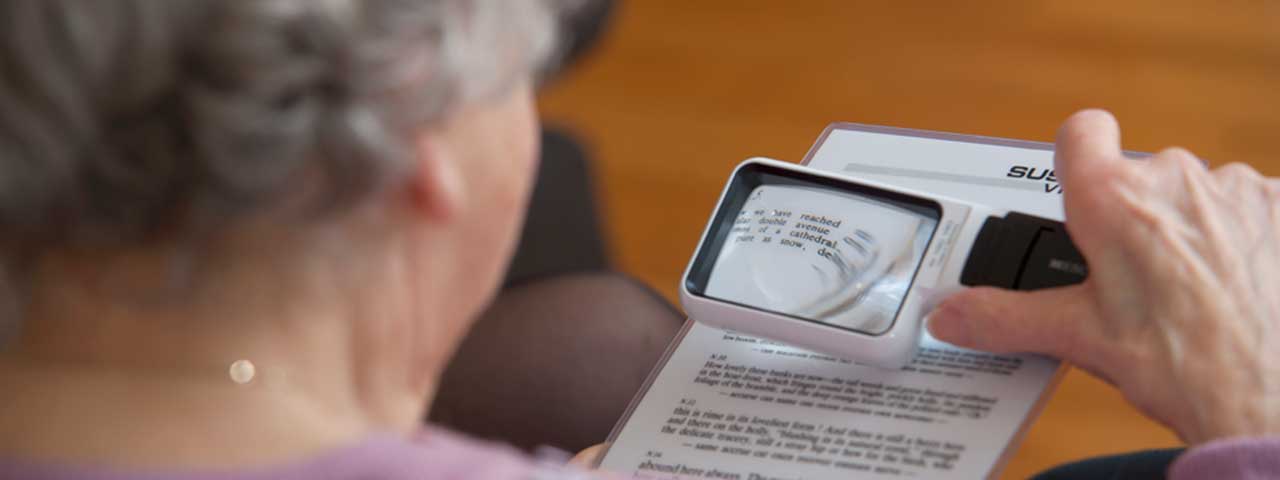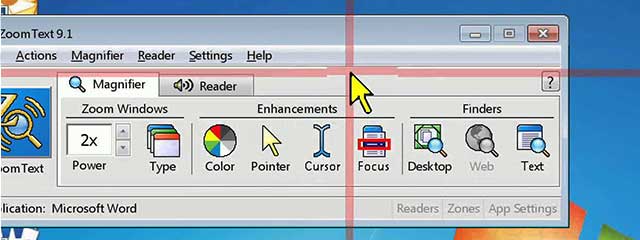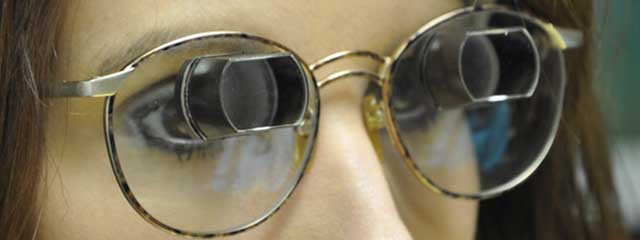
Chapter 7 - Rehabilitation And The Skills Of Daily Living
Rehabilitation And The Skills Of Daily Living in Lititz
It is normal and natural to be concerned with how you will manage your daily activities without full vision. Fortunately, there are professionals who are available to help you learn the skills necessary to continue performing those tasks and remain independent.
Some Of Those Eye Care Professionals Include:
- Teacher of the Visually Impaired
- Vision Rehabilitation Specialists
- Low Vision Optometrists
- Low Vision Ophthalmologists
- Driving Rehabilitation Specialist
- Occupational Therapists
- Rehabilitation Psychologists
- Orientation/Mobility Specialists
- Low Vision Therapists
Many of the common tasks that become difficult, such as cooking, cleaning, dressing, self-care, reading mail and writing checks are part of the “skills of daily living”. Each person and each condition may require an evaluation by the appropriate eye doctor to help you learn the skills you will need. The first priority is your safety.
Safe Travel And Mobility
It is critical that you adjust to a new way of life and make safety your priority. As your vision changes, your eyes will perceive light and colors differently. Your detail vision becomes difficult and your depth perception may change. You will need to modify your environment to accommodate these changes. Make sure that your home is well lit and that you remove objects that might cause you to trip or fall. If you have steps in your home or yard, you may need to add contrast in the form of brightly colored paint or tape so that you can see where each step begins. Using velcro strips or other textured items can help you identify objects that you use daily.
If you believe you have sufficient vision to continue driving safely, the first step would be to discuss it with your Low Vision Doctor. Ask the low vision doctor about bioptic telescopic glasses, and to recommend a driving rehabilitation instructor.
Depending on your level of vision loss, the DMV may place limits on your license. It is not uncommon for DMV to limit your license to local driving only, under 40 miles per hour, or local streets only.
Driving Rehabilitation
The Driver Rehabilitation Optometrist aids individuals with disabilities or age-related impairments to maintain independent driving and transportation. Before actually driving, they begin with an assessment of the individual’s skills that are necessary for safe driving. If the optometrist believes that safe driving is a possibility, an in-vehicle driving assessment is conducted with a vehicle equipped with dual controls. Handicapped driving instructors evaluate driving skills and teach how to use your remaining vision to drive safely. They may also recommend adaptive devices like bioptic telescopic glasses and special mirrors to increase your safety.
Contact:
- The Association for Driver Rehabilitation Services (www.aded.net)
- The Occupational Therapy Association (www.aota.org)
It is advisable that you plan for the day when you can no longer drive at all by learning of other options for traveling. This might mean moving to a location where stores and buildings are nearby. Urban areas tend to have better train and bus systems. Figure out exactly what services and stores you need and determine how that can be handled if you cannot drive.
If vision loss makes walking dangerous, please seek out the services of an Orientation/Mobility Specialist.
Orientation/Mobility
Orientation and mobility optometrists teach low vision and blind patients how to get about safely and independently in their environment or in unfamiliar surroundings. If necessary for safe travel, they may suggest the use of adaptive equipment such as walking canes, white canes, service dogs or GPS systems.
Contact:
- Your local department of rehabilitation
- State department of blind and visually impaired
- American Foundation for the Blind (www.afb.org)
Google: Orientation/Mobility Instructors
Safety In The Kitchen
If you plan to cook, seek assistance from a friend or loved one for more difficult tasks like cutting, using the stove or oven, or boiling water. Plan to work with an appropriate therapist who will teach you safe ways to perform those tasks. You may become discouraged. It’s a normal reaction. Please understand that the changes you have to make are for your own good and do not mean your life is over. Lists of appropriate optometrists and therapists who can help you adjust follows.
Vision Rehabilitation
V.R. Eye Doctors teach adaptive independent living skills. They teach the use of compensatory skills and assistive technology that will enable blind and visually impaired people to live safe, productive, and interdependent lives. They can help enhance vocational opportunities, independent living, and educational development.
V.R. Eye Doctors will also assist patients with everyday tasks such as reading, writing, using a computer or any other tasks that need to be re-learned as vision is lost. They can also educate patients on the use of low vision devices and services.
Contact
- visionaware.org
- The Academy for Certification of Vision Rehabilitation & Education Professionals (www.acvrep.org)
Occupational Therapists
OTs are trained to assist disability patients with skills of daily living. Occupational Therapists perform an evaluation to see what daily activities you are struggling with. A plan is created to assist you in improving those activities. They will also work with you using specific exercises or adaptive devices to strengthen areas of weakness. When searching for an O/T, be sure to locate a Low Vision Certified Occupational Therapist.
Contact
- The American Occupational Therapy Association (www.aota.org)
Managing Life
There are a variety of assistive devices available that can help you with everyday living tasks. If you have internet access, google “low vision assistive devices”. A list of some companies that sell such devices is included below.
Some Tasks May Include
 Grocery Shopping
Grocery Shopping
Hand Magnifiers and portable electronic magnifiers allow people to see prices and labels. There are also apps that can be downloaded on your cell phone that can assist you with grocery shopping by scanning and reading labels or menus. Making a shopping list ahead of time on a digital recorder will help you to better plan your shopping trip. Most grocery stores have staff willing to assist you in finding the items on your list.
Finance
Your low vision doctor should be consulted on these tasks. Usually, a low vision device will be helpful in reading bills or other important documents. Banks will provide large print checks and writing guides.
Clothing
It is helpful to ask a loved one to assist you in color coordinate your closet. Using large print labels may help you find the clothing items you want. Avoid clothing with many small buttons.
There are many companies that sell products designed for independent living. As an example, magnetic clasps for bracelets and necklaces to replace jewelry connectors may be helpful for some people. Review the sources at the end of this chapter for the many products available.

Computer
Again, your Low vision doctor will address this with you. If low vision glasses are not the solution, software programs like ZoomText are very helpful. Many computer programs come with built-in magnifiers already. There are many organizations that offer classes on how to operate Braille computers as well.

Teaching The Visually Impaired
Teachers of the visually impaired are educators that specialize in teaching visually impaired individuals. They may use devices such as braille computers or large print textbooks to help individuals reach their educational goals.
Educating Family And Friends
We must get through the embarrassment and discomfort of letting people know that we need assistance. Trying to keep it from them causes more problems than it is worth.
- Practice humility.
- Create a network of support. Your family, friends, loved ones and professionals should be there to help and support you as needed. They may be able to assist you with driving or getting from location to location. They also can offer encouragement and help you find new activities that you enjoy. Talk to them and request their support.
Rehabilitation Psychologists
Rehabilitation Psychologists specialize in providing services to patients who have undergone a traumatic event that is preventing them from functioning. Rehabilitation psychologists will work with patients to overcome symptoms such as anxiety and depression. They may prescribe medication or suggest counseling sessions.
Contact:
- American Board of Rehabilitation Psychology (www.abrp.org)
- www.psychologytoday.com
Enjoying Life
Being visually impaired does not mean life cannot be enjoyable. Your hobbies and favorite recreational activities do not have to come to an end.
Activities That You Can Still Participate In

Television
Sitting closer to the TV, purchasing a larger TV, or using low vision telescopic glasses are possible solutions to enjoying programs. The Library of Congress offers braille and audio services for eligible patients. If eligible, you can order audiobooks and magazines.

Recreational Activities
Occupational Therapists can help you with activities that you are struggling with. The O.T. will help determine what the issues are and help find solutions. Your low vision doctor may be able to prescribe glasses for playing cards, going to theater or sporting events, etc.
Sources For Assistive Devices
Independent Living Aids, Inc.
200 Robins Lane, Jericho, NY 11753 – 516 450 3829
www.IndependentLiving.com
Easier Living.com
297 High Street, Dedham, Ma 02026 – 855 493 9856
The Low Vision Store
www.thelowvisionstore.org – 800 871 8780
LS & S Products
145 River Rock Dr, Buffalo, NY 14207 – 716 348-3500
Maxi Aids
www.Maxiaids.com – 800 522 6294
Ease Living
www.easeliving.com – 855 337-7033
For a complete list, we suggest an internet search for low vision assistive devices.

“Whenever and wherever possible, the team approach to low vision rehabilitation offers the most effective benefits for the patient”.
Rebecca Kammer, OD, Ph. D
Low Vision Optometrist
Orange County, California
